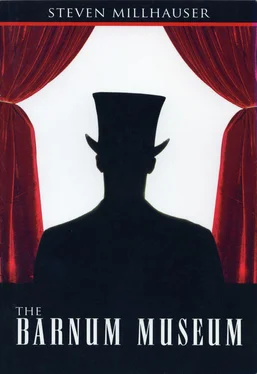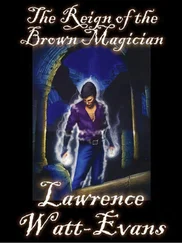Poor thing.Miss Scarlet slips nimbly from her body and takes up a position not far from the window seat, where she observes with interest the scene before her: the Colonel’s pale, well-muscled, heaving buttocks peeping out from beneath his agitated shirttails (the Colonel is naked only from the waist down), the young woman’s raised knee pressed back against her ribs by the Colonel’s splayed hand, a tangle of pink and white at the ankle of the other foot. The young woman’s visible arm is stretched out, the hand limp at the wrist; her face is turned to one side and her eyes are closed. She looks for all the world as if she has been slain — only, from time to time, a barely perceptible tremor passes over her body. Poor thing, Miss Scarlet thinks.
Stunning.Susan is not deceived, by Marian’s gesture, into sudden intimations of intimacy. She is grateful anyway. She sets down the bowl beside her glass of wine, bites into a saddle-shaped chip, and looks directly at Jacob’s sister, whose face is already turned toward David. At that moment, in that light, at that precise angle, Marian’s unlovely face is stunning: her high cheekbone shines, the tide of her hair rolls along her face and dashes down on her shoulder, the sharp proud line of her forehead and nose slashes across the dark green blinds like a blade of light. Susan’s hair has been admired since early childhood, but she feels that its straightness shows lack of character. She has always been attracted to forceful, intelligent, unbeautiful women stronger and bolder than she. In high school her best friend had wild hair and braces, wore torn jeans and floppy lumberjack shirts, practiced the violin three hours a day, and once punched a boy in the mouth when he refused to stop torturing a cat. Susan is willing to be proud of her hair because Jacob adores it, but if she were Jacob she would be more critical. Jacob is stern when it comes to her taste in literature (Faulkner is a gasbag) and music (rock music is what Yeats meant by “mere anarchy is loosed upon the world”), but he is reverent toward her body, which makes him seem careless. If she were a man, she would want to plunge both hands into Marian’s torrent of hair. If she were a man, she would reject herself and choose Marian.
Mrs. Peacock and Mr. Green.Mrs. Peacock cannot endure the presence of Mrs. White for another second: the slumped shoulders, the dark eyes glistening with desolation, the hands moving helplessly, the air of dazed bewilderment, all these inspire in Mrs. Peacock a sense of suffocation. She must escape from this room that is filling up with grief, a grief that rushes outward in all directions, pushing down everything in its path, pressing against the walls, hurting her skin. “Yes yes, dear,” Mrs. Peacock says, “it will be all right,” and escapes from the desperate gaze, the inconsolable bulk of flesh. She makes her way down the corridor toward the DINING ROOM, passing on her way the corridor to the BALLROOM, where she is surprised to see Mr. Green standing with his hand on the doorknob, his head half bowed. At the sound of her footstep Mr. Green whirls to look at her, gives a gasp, then fumbles at the door and thrusts it open, disappearing within. A queer one, Mr. Green. One might almost think he was afraid of her.
Endgame.David knows that the murder was committed by Mrs. Peacock, with the Candlestick, in one of three rooms: the BILLIARD ROOM, the DINING ROOM, or the BALLROOM. The game is winding down now; it is simply a matter of moving his piece across the board from room to room, eliminating the incorrect ones. Although Susan’s guesses have grown more skilful, she does not appear to know either the murderer or the room, but David is less certain of Marian and Jacob. Jacob almost never loses at Clue; his logic is flawless, his instincts sure. Marian, in her quiet way, is a dangerous player who can never be ruled out. David knows, from his system of checkmarks and X’s, that Jacob has identified Mrs. Peacock and the Candlestick; he is almost certain that Marian knows both, though he can’t be sure about the weapon; all three of them are moving from room to room, searching for the final clue. This part of the game always draws attention to another disturbing flaw in the game’s design: although play is supposed to be based on logical inference, it admits a high proportion of sheer chance, since each time a player’s token is accused of the murder it must be moved to the room in question. One is continually being whisked away, to the wrong part of the board. Jacob is known to absorb this whimsical element of the game directly into his strategy, and to make a useless Suggestion deliberately, for the sake of removing a token as far as possible from its apparent destination. He has already pulled David across the board to the STUDY, which he knows David holds in his hand, thereby delaying David’s progress and wasting a move of his own; the result is to give Marian an advantage in the race to new rooms. The game cannot last much longer. David is pleased to see Jacob bending intensely over his Detective Notes, trying to wrest an additional secret from his complex system of marks; Jacob seems in a better mood, he has been drawn into the game. David wonders what will happen next. Will there be another game? It’s almost one in the morning. Will Susan retire and leave the three of them together, to talk in the living room? Marian seems tired; perhaps she too will go upstairs. Will Jacob want to stay up till dawn? Will they walk to 7-Eleven and buy Cokes at four in the morning? Will they go down to the beach and walk out to the end of the jetty and sit looking across the black Sound toward Long Island? The foghorns are silent now; maybe the sky has cleared. Will Jacob want to talk? Will he talk about Dad? About Susan? His writing? David hopes he can somehow let Susan know that it’s all right for her to be here on his birthday. He shakes the die in his loose fist, enjoying the tension of the game, holding back, savoring the moment when he will suddenly open his hand and watch the red die tumble across the bright, loud board.
Just going.As Mr. Green hurtles into the BALLROOM he sees, on a corner of the distant window seat, Miss Scarlet sitting with her hands in her lap. Ten feet away the Colonel stands with his back to Miss Scarlet and his hands clasped behind his back. Miss Scarlet looks up, the Colonel turns his head: they are waiting for an explanation. Mr. Green cannot speak. His cheeks are aflame, his heart is pounding, he feels light-headed with embarrassment. The Colonel goes to the window, picks up a dark object, turns sharply on his heel, and begins striding toward Mr. Green. The Colonel is going to strike him. The Colonel is going to murder him. Mr. Green cannot move. “I say, Green,” the Colonel says, striding directly up to him. “Forgot your book.” The Colonel thrusts out the book. Mr. Green feels a bursting sensation in his heart; tears of gratitude prickle his eyes. “I am so terribly sorry,” Mr. Green says. “I mean happy, of course. I do hope I haven’t—” “I was just going,” the Colonel remarks.
The black envelope.The black envelope is a little larger than the cards it contains and is open at one of the narrow ends. In the open end is a shallow semicircular notch intended to ease removal of the three hidden cards. On one side of the black envelope appear the words CLUE CARDS, printed in dim silver. On the other side the structure of the envelope is visible: a single sheet of black paper has been folded in such a way that narrow strips overlap the side and bottom; the overlaps are glued in place. Years of use have caused the black envelope to tear at the corners of the open end; minuscule black hairs of paper twist from the splits.
In which the Colonel is thirsty, and goes to the kitchen for a glass of water; and what he finds there.The Colonel feels a slight dryness in his throat after his late exertions and, as he passes the KITCHEN, decides to drink a glass of water before proceeding to the BILLIARD ROOM. When he enters the KITCHEN he sees, in the middle of the room, buxom Mrs. White, standing sideways and holding in one hand a tilted but unspilled glass of water. She is staring straight before her, with her lips slightly parted; her cheeks are wet with tears. Her slumped shoulders, her gleaming cheeks, her loosening braids of hair, her air of desperate disarray, all these form a pleasing foil to her ample well-corseted bosom and handsome high posterior. “Pray forgive me for disturbing you,” remarks the Colonel, and closes the door gently behind him as Mrs. White turns her dazed wet face in his direction. The Colonel makes a quick calculation. There will still be time for a game before dinner.
Читать дальше












